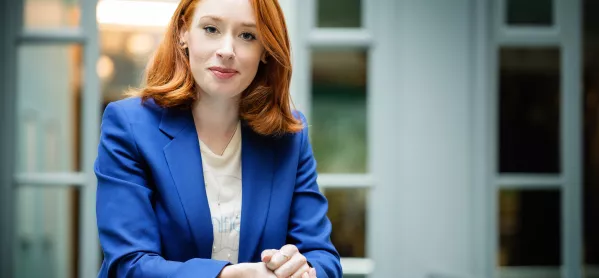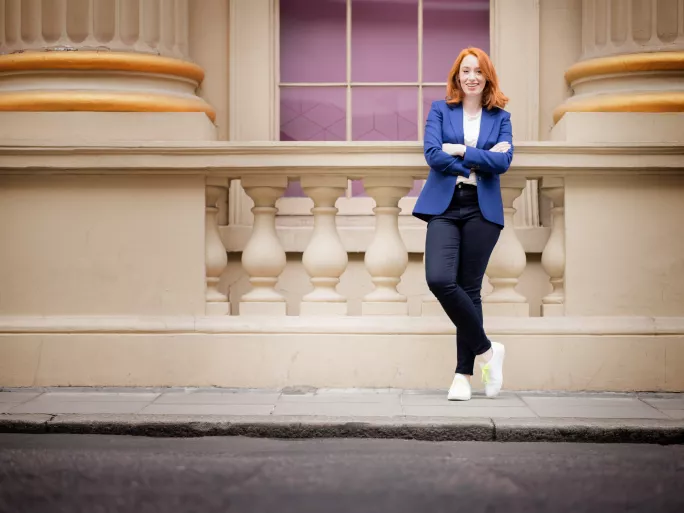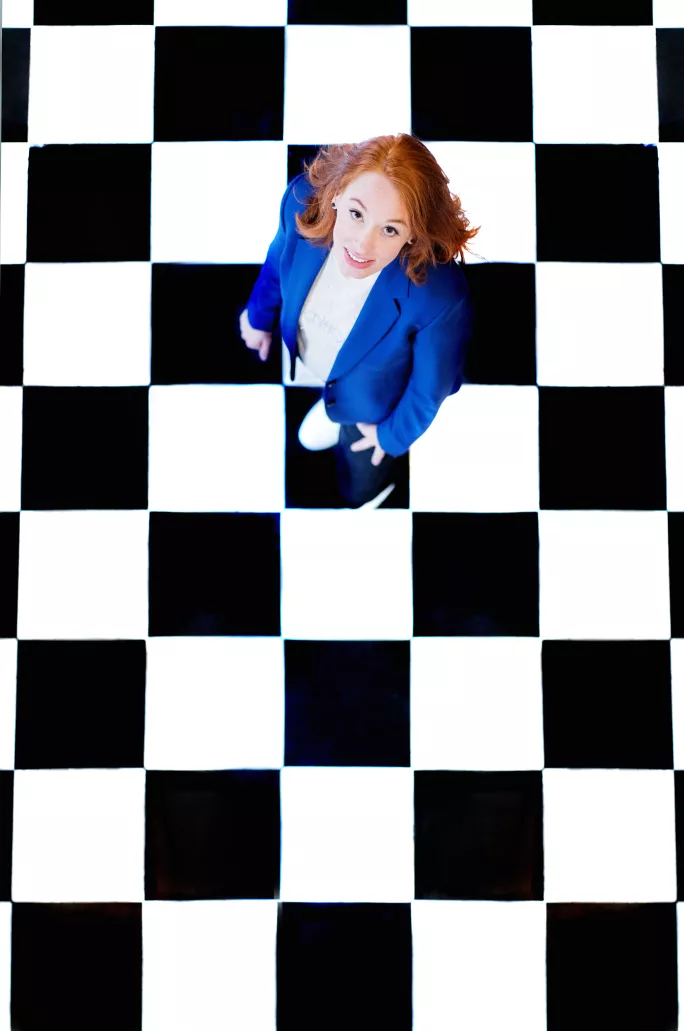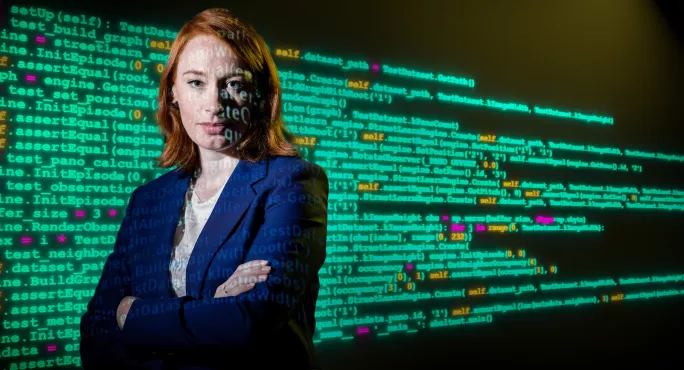- Home
- Dr Fry, or how to stop pupils worrying and love maths
Dr Fry, or how to stop pupils worrying and love maths

What do you think about when you think of maths?
Is it rows of numbers and symbols merging into a fuzzy cloud during a late-night cramming session? Something abstract you either enjoyed as an intellectual exercise or loathed with your whole self? The subject you are trying to get your students to embrace?
For Hannah Fry, maths is instead the most exciting gossip story.
“You know when you have a really good story and you go to the pub and tell your friends, ‘Let me just tell you this gossip,’” she says, with enough enthusiasm to make you think she’s really about to tell you something outrageous.
“That’s how I view maths communication. You just have this really clever story with these amazingly surprising twists and turns that you want to tell people about”.
That this is not a common view is a matter for regret, says the academic who has carved out a leading role in promoting maths to the public through the mass media, TV and TED talks.
“I always thought it was a real shame that this subject has a terrible reputation, of being this dusty, old, boring subject - for me it couldn’t be further from the truth,” she says.
For Fry it was a teacher who helped her to understand that truth and enjoy maths. And she has valuable advice for teachers who want their pupils to make the same leap.
It’s not that she doesn’t appreciate what they are up against. “People come with the preconception that maths is difficult, irrelevant and uninteresting,” she acknowledges.
But Fry is adamant that certainly the last two of these perceived problems can be torn to pieces.
“While you can go through your life ignoring the fact that maths exists, if you open your eyes to what it can do, it just reveals this completely new way to look at the world around you,” she says.
From the classroom: 5 problems that add up to trouble for maths teachers
Read: Poor maths skills cost the economy £388m per week
Research: Boys overestimate their maths ability more than girls
“If I told you how you can use maths to look at the way you argue with your partner when you are in a long-term relationships; or if I told you that farmers can use maths to make sure that their cows have more female calves; or if I told you that the police can use maths to track down serial killers - this is real-world stuff that totally and completely has a space for maths to be part of the conversation.
“I think that when you reveal those stories, you can’t deny that maths is definitely interesting and definitely relevant to all of us.”
There is a host of resources that teachers can use, she says - look online, and at Youtube in particular, which she says has “democratised maths communication”.
Mathematical gossip
Fry has done a pretty good job of that herself. The associate professor in the mathematics of cities at the Centre for Advanced Spatial Analysis at University College London is well known to the public outside academia for her BBC documentaries, radio shows and podcasts.
In 2014, she came up with her own mathematical gossip story: presenting three maths-verified tips to maximise your chances of finding love and making it last.
She didn’t just go to the pub to tell her friends, though. Instead, she held a TED Talk, and since then, over 5 million viewers have heard her convincing argument.
Equations and symbols are not just “a thing”, she says.
They are a key to understand patterns in the world around us - and that applies to human behaviour as well. After making the audience a little bit more savvy on what mathematics can say about online dating, how to find a soulmate and how to avoid divorce, she ended her talk with these words: “I hope that…a little bit of insight into the mathematics of love can persuade you to have a little bit more love for mathematics.”

Fry admits that the idea that maths is “difficult” is the hardest preconception about her subject to tackle. “You can’t pretend otherwise,” she admits. But that too can be overcome.
One way to demystify maths’ difficulty is to explain how democratic it is: it’s difficult for everyone - even for Fry, as surprising as that may be. The difference is that she enjoys the challenge.
Facing the fear of maths
“There’s a real fear that when you see a new page of maths you have never come across before, it’s like reading a different language,” she says.
“And I think that it’s important to say that when you are a professional mathematician you still get that. That never, ever goes away. The only difference is that I am really comfortable with being uncomfortable.
“I am very comfortable with the fact that however horrible it looks on the surface, I know that if I just break it down into smaller and smaller pieces I will get there eventually.”
Teachers know that to get students to tackle complex challenges and enjoy the process they need to fight a well-known enemy first: fear of failure. And with a challenge as complex as mathematics, confidence also plays a big part.
Confidence may be part of the reason why girls drop out of maths, Fry explains.
“I think one of the reasons why girls shy away from it is that if your confidence drops, it’s very difficult to get back from that.
“And I think that boys tend to be better at blaming outwards, so when they are finding the subject hard they are better at saying that the subject is hard, and instead, in my experience, I found that girls tend to internalise that and say that it’s them.”
The focus, she explains, should be on why girls are dropping out, not necessarily on why girls don’t choose maths.
What was school like for a girl who didn’t drop out, and went on to become one of maths’ most passionate champions?
Not always the maths genius
“It’s not like I am incredibly gifted as a mathematician,” she says.
“I think there are mathematicians who are leagues ahead of me, in terms of their ability.”
Where this leaves the rest of us, she doesn’t say. But she adds that when she was at school, she wasn’t singled out as “The Mathematician”.
At school, she recalls, maths was one of her strongest subjects, but there were other people that were just as good or better than she was, she adds.
What made the difference in the classroom, though, was her teacher: Fry remembers her kindness, and her ability to create a learning environment where maths wasn’t frightening.
“I had one teacher for the whole of my secondary school. I was really lucky, it just happened. She was called Mrs Andrews and she was just very kind,” she says.
“She created an environment where it was OK to just like maths, to just enjoy it and not to be afraid of it - and certainly not to be afraid of failing in it.”
However, being a mathematician wasn’t on the cards at that stage, at least not for her.
“What I actually wanted to do, my kind of life plan,” she recalls, “was to be a hairdresser.”
She told her mother she was going to leave school after her GCSEs and do hairdressing, but she had other plans.
With her father a factory worker and her mother a stay-at -home mum, she and her sisters were the first ones to go to university in her family.
“My mum said, ‘I think you should just do your A levels, in maths, further maths and chemistry,’” she says. And then it was her mother again who pushed her to go to university.

“She told me, ‘I think you should do a maths and theoretical physics degree, and then we talk about afterwards,’” Fry recounts.
“In terms of having someone that was at the end point of what I was aiming for, and then following their path, or using their trajectory as a benchmark to measure myself against, there wasn’t anything really,” she says.
Fry says that, looking back, she’d like to have studied engineering. But in an all-girls school, that just wasn’t on the table.
“If I lived my life over, knowing what I know now, ultimately I wanted to be an engineer. I wanted to do engineering in Formula 1.
“But I went to an all-girls school, and so engineering just wasn’t on the table. It just literally never came up. I didn’t really realise it was possible.
“It just never occurred to me,” she recalls.
Secrets and lies
There’s not much that can be compared to the excitement of Formula 1, but the Christmas Lectures at the Royal Institution are a fair contender.
Started in 1825, the lectures are an annual event meant to ignite a love for science in the young - and less young.
The first series was held by Michael Faraday, and over the years they have hosted Nobel Prize winners and household names - the likes of Sir David Attenborough or Carl Sagan.
This year, Fry is taking the stage with a series of lectures titled “Secret and Lies” - which will be broadcast on 26, 27 and 28 December on BBC Four.
The lectures promise to be packed with fun and daring experiments, with mentions of a giant pendulum being launched at a volunteer’s face, safe in the certainty of a near-miss - because of maths.
But the central topics of the lectures will be to show how maths can be used to understand the world, how algorithms can influence the world around us, and where the limits of data lie.
With the influence of algorithms on daily life becoming more and more evident, the question is whether maths education as it currently stands is preparing students to understand these powerful tools that are shaping society.
For Fry, the best approach to tackle the topic in schools is multidisciplinary, where maths goes hand in hand with the humanities.
“Social media and filter bubbles - that’s the perfect crossover between something that’s very mathematical and scientific, as an algorithm, that’s been used to order something very qualitative, such as newsfeeds,” she explains.
“But the impact that’s having on society is something you may be able to quantify but you can only really understand if you are coming from the perspective of the humanities.”
What other thoughts does she have about the maths curriculum?

A few weeks back, maths teachers responded en masse to a tweet by the Mathematical Association asking them to indicate the hardest problem the profession is faced with.
One of the most common complaints was the “crammed” primary curriculum, with one frequent target: Roman numerals.
Asked what she thought about their complaints, Fry joins the Roman numerals bashing.
“The thing about Roman numerals is that they might look nice when you engrave them on a building, but they are not very good for addition and subtraction,” she says.
“Other things are more important - addition, subtraction, multiplication, fractions, percentages.”
Strange obsession
And Roman numerals don’t even get the worst of Fry’s wrath. It’s circle theorems that bear the brunt.
“We do have this kind of strange obsession, like a historical obsession, with certain topics…like circle theorems. They are at GCSE, I think. I literally don’t see what the point is,” she says, laughing.
Fry says that while there are some things, such as algebra, that may feel pointless when you learn them but then go on to become “unimaginably powerful” (her words), circle theorems are not one of those.
“I have never seen them since [school], and I am a professional mathematician,” she points out.
And it’s not like she didn’t even try to find the point. Fry recounts doing a show for teenagers with two fellow maths communicators, Matt Parker and Rob Eastaway. The aim of the series, called “What’s the point?”, was to take something out of the GCSE syllabus, suggested from teachers, and show students that there is a reason for studying it.
“Almost all of them were incredibly easy to do,” she recalls.
“Apart from one when a teacher submitted circle theorems, and I swear to you, me and these other two professional maths communicators spent days trying to think of something that we could say that wasn’t completely boring about circle theorems - and we failed, totally!”
In the end, Fry confesses, they had to agree that there really was no point.
She suggests that the insistence on certain topics can play its part in damaging the reputation of maths as a subject.
“If you are asking your teachers to persuade students that this subject is relevant, pertinent and interesting...and then you teach them bloody circle theorems…” she says, with a baffled face, before apologising to anyone who likes them.
For someone on a mission to make people fall in love with maths, circle theorems must indeed feel like an enemy.
Hannah Fry: CV
- Mathematics and theoretical physics degree, University College London
- PhD in fluid dynamics, University College London
- Associate professor in the mathematics of cities, Centre for Advanced Spatial Analysis, University College London
- 2013: Winner of the UCL Provost’s Public Engager of the Year
- 2018: Qwarded the Christopher Zeeman Medal for her contributions to the public understanding of the mathematical sciences.
BBC documentaries:
City in the Sky, Britain’s Greatest Inventions, Climate Change By Numbers, Calculating Ada: The Countess of Computing, Horizon: How to Find Love Online and The Joy of Data.
Books
- 2015: The Mathematics of Love: Patterns, Proofs, and the Search for the Ultimate Equation
- 2016: The Indisputable Existence of Santa Claus
- 2018: Hello World: How Algorithms Will Define Our Future and Why We Should Learn to Live with It - shortlisted for Bailie Gifford Prize for Non-Fiction and the Royal Society Book Prize
Keep reading for just £1 per month
You've reached your limit of free articles this month. Subscribe for £1 per month for three months and get:
- Unlimited access to all Tes magazine content
- Exclusive subscriber-only stories
- Award-winning email newsletters



